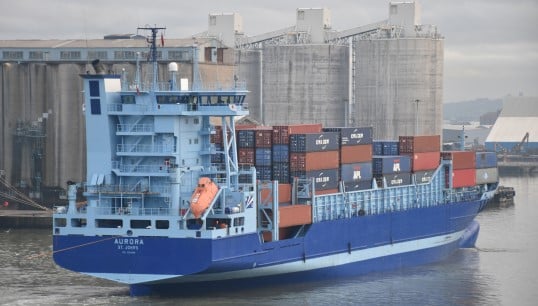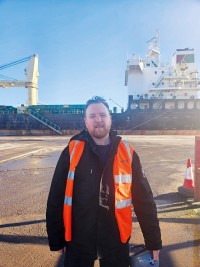- Topics
- Campaigning
- Careers
- Colleges
- Community
- Education and training
- Environment
- Equality
- Federation
- General secretary message
- Government
- Health and safety
- History
- Industrial
- International
- Law
- Members at work
- Nautilus news
- Nautilus partnerships
- Netherlands
- Open days
- Opinion
- Organising
- Podcasts from Nautilus
- Sponsored content
- Switzerland
- Technology
- Ukraine
- United Kingdom
- Welfare

Nautilus is shining a light on life-changing injuries sustained by a seafarer while unlashing cargo at the Port of Liverpool – and working with the ITF to find out why no thorough investigation has been conducted by the flag state or UK authorities. Rob Coston reports
Lashing and unlashing cargo is a dangerous task often carried out by exhausted seafarers, sometimes without pay – and sometimes with tragic consequences.
The consequences were certainly horrifying for one Filipino seafarer, who was asked to perform this duty when his vessel – MV Aurora – called at the Port of Liverpool in January 2024. The vessel, registered in Antigua and Barbuda, was operated by BG Freight Line, a subsidiary of Peel Ports, which also owns and operates the terminal.
An incident occurred when twist locks securing a stack of containers were not fully disengaged before a dockside crane began lifting the top container due to a lack of communication between shore and ship personnel, according to a representative of the flag state from their brief on-scene review and based on the port’s draft investigation. As the lift went ahead, the remaining locked corners created a concertina effect, causing the bottom container to swing and crush the seafarer, who was positioned nearby.
Emergency services used specialist inflatable lifting equipment to free the injured crew member before airlifting him to hospital. He suffered a cardiac arrest en route but was resuscitated and survived. However, he was left paralysed from the waist down and remains unable to work.
At the time of the accident, the seafarer had reportedly finished his previous shift at 06:00hrs and had only four hours’ rest on a stormy Irish Sea before being set to work.
ITF involvement
International Transport Workers’ Federation (ITF) inspector Matt Parsonage became involved in the case and went to visit the seafarer in hospital. ‘He was laid up in his bed, with stitching all down his legs from the surgery,’ Mr Parsonage says.
At that stage, the seafarer had been in hospital for six weeks, away from home with no visitors. ‘I started taking a statement from him, because no one had taken a statement – which was quite shocking.’
This was the first indication that something was wrong with the investigative process. At this stage Mr Parsonage – in his role as an ITF inspector – was focused on ensuring the best possible outcome for the seafarer. He helped the seafarer to understand his contractual rights, such as the stipulation to maintain regular contact with his employer regarding medical appointments and outcomes in order to keep receiving his basic pay after repatriation. He continued to
monitor this until all payments were made, as the employer paid late on some occasions and there was confusion regarding currency conversions.
The investigations
A lack of action by authorities quickly became clear. Under the International Maritime Organization’s (IMO) Casualty Investigation Code and the the International Labour Organization's (ILO) Maritime Labour Convention (MLC), marine casualties are expected to be investigated, and the findings must also be made available publicly to promote safety lessons. Yet after months of enquiries by Mr Parsonage and repeated questions from Nautilus general secretary Mark Dickinson to the authorities, it has become clear that neither the port, flag state nor relevant UK authorities have undertaken a comprehensive investigation or published a report into the accident.
‘Because this incident happened at the ship-shore interface, it’s almost like a grey area, a No Man’s Land for responsibility,’ Mr Parsonage says. ‘Eighteen months on, there is no published official investigation report. No lessons have been shared, and ultimately there has been no accountability.
‘Since the day of the accident, we’ve been trying to get answers, but every authority involved has either deflected responsibility or gone silent. We have the flag state for the vessel, Antigua and Barbuda, which is meant to perform an investigation as per the MLC and IMO Code, but they stated in writing that they only did a short on-scene review, liaised with the UK Marine Accident Investigation Branch (MAIB), and communicated with the port operator before deciding that their job was done and a full investigation would not be conducted.
‘Meanwhile the port says that they believed that the flag state did the investigation, and they’ve also claimed to us in writing that their own report is legally privileged, meaning no one is allowed to see it.
‘It begs the question of how can you have an official, independent investigation into an incident where someone is nearly killed which is based on a report from the company that operated the vessel and owns the port, and which is legally privileged? How can that happen?’
Tired and overworked seafarers should never be required to carry out work in unsafe conditions. This kind of activity in our ports is unacceptable, and undermines everyone’s safety Nautilus general secretary Mark Dickinson
Fighting for all seafarers’ safety
Both the ITF (via Matt Parsonage) and Nautilus International have been seeking answers and pushing for accountability.
While some members may wonder why a union that represents seafarers from the UK, the Netherlands and Switzerland would get involved in a case that involves a Filipino seafarer working onboard a foreign-flagged vessel, for general secretary Mark Dickinson the reasoning is clear.
‘It is important for Nautilus to support the work of the ITF in this – not just because it is clearly the right thing to do, but also because it is important for our members in a practical sense,’ he says.
‘Tired and overworked seafarers should never be required to carry out work in unsafe conditions. This kind of activity takes place around the world. It is unacceptable. It undermines everyone’s safety – including that of Nautilus members.’
Mr Parsonage sees a pattern of behaviours by flag of convenience feeder container vessels. ‘The use of exploited labour on these foreign-flagged ships – who are paid less than trained dockers – means that when something goes wrong, there’s less scrutiny, there’s less accountability and fewer protections. It’s clearly another form of exploitation and undercutting, and absolutely affects UK seafarers who are members of Nautilus. It drives down standards and normalises unsafe practices.’
Muddled responsibility for UK investigations
The ITF and Nautilus have been working hard to find out exactly why the UK investigative bodies have not completed a comprehensive investigation into the incident, so that the facts can be established, and lessons can be learned.
In the UK there are three bodies which have responsibility for investigating accidents in ports or at sea: the Marine Accidents Investigation Branch (MAIB), the Health and Safety Executive (HSE) and the Maritime & Coastguard Agency (MCA).
Each of the bodies has a remit to cover certain areas on land and sea and particular types of incidents. The nature of the Aurora incident means that, when questioned, each authority has contended that it is not responsible for conducting a deeper investigation.
For example, the MAIB wrote to inform Mr Dickinson that, ‘while the injuries were life changing, they did not constitute a Very Serious Marine Casualty as defined in the IMO’s Casualty Investigations Code (CIC) … Nor did his accident meet the criteria of a Serious Marine Casualty, as defined by MSC-MEPC.3/Circ.3. Consequently, the MAIB was under no obligation either to carry out a mandatory investigation or a formal Preliminary Assessment.’
The ITF followed up with the HSE, which had started an investigation and told Mr Parsonage that he would have to check back in four months. However, to gain access to the findings, he eventually had to resort to a Freedom of Information request.
In its report, the HSE had considered technical health and safety compliance for lifting operations, e.g. whether the employer had full procedures for working under loads in place, and whether maintenance schedules were in place for the crane. Mr Parsonage describes the report as ‘paltry’.
A separate representative at HSE had previously told him on a video meeting that they remembered the discussions over the incident and that it had been mutually decided the MCA would take the lead.
Mr Parsonage had emailed the MCA about the investigation and referred to it with them over the telephone during discussions about the issue of seafarers performing lashing/unlashing of containers (though he did not directly ask about the incident, as at the time he had been told by the seafarer’s lawyers that HSE were investigating). However, the Agency claimed to Mr Parsonage that it was unaware of the situation until a Port Welfare Committee meeting in October 2025 – nine months after the incident. This was completely contradictory to the conversations and emails he had had with them. Further, the incident had been raised at an earlier Port Welfare Committee meeting in February 2024.
Justice must prevail
Nautilus and the ITF are continuing to pursue this case, with Mark Dickinson talking to people at the highest level in the three responsible UK bodies. On the international level he has made the ILO aware of the case, and in the UK, he has taken it as high as the maritime minister. A response is awaited from the new MP in that role, Keir Mather.
‘We need transparency and we need the buck to stop being passed between flag state, port and UK safety agencies,’ Mr Dickinson says. ‘And we need reform – an end to the unsafe practice of forcing crew to do lashing and unlashing. This is work for trained and rested dockers not overworked seafarers.
‘Justice must prevail for the injured seafarer, but we must also learn the lessons from this tragedy. That is why we continue to pursue the publication of the investigation reports, as required under the MLC.’
Tags
